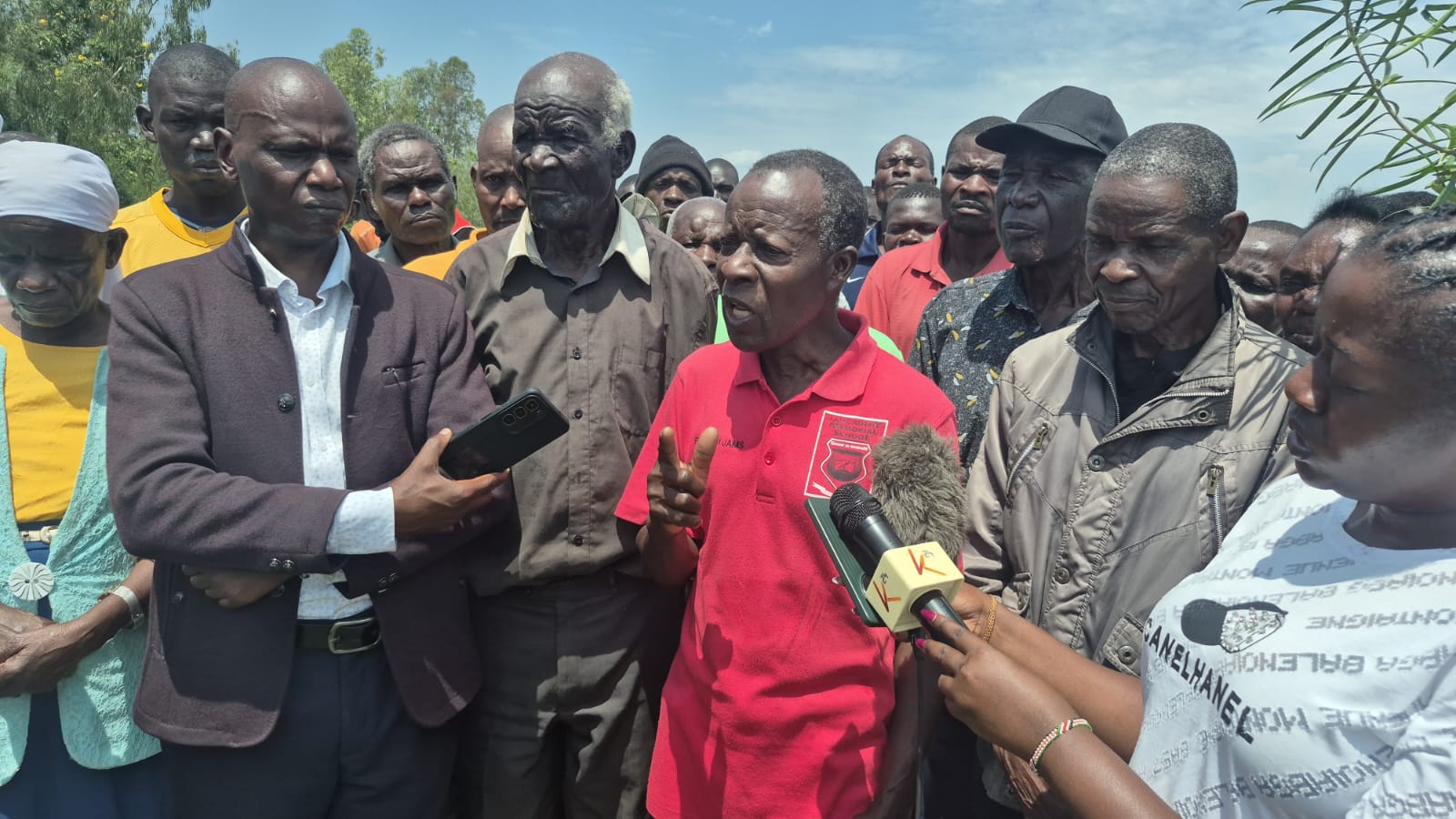 Residents of Koguta Village in Muhoroni Sub-County address the media on Monday, October 27, 2025, over the ongoing land dispute. Photo/ Odhiambo Alal
Residents of Koguta Village in Muhoroni Sub-County address the media on Monday, October 27, 2025, over the ongoing land dispute. Photo/ Odhiambo Alal
By Odhiambo Alal
More than 1,500 members of the Koguta community in Muhoroni, Kisumu County, are calling on the government to expedite their long-overdue resettlement on ancestral land they say was officially returned to them by the National Land Commission (NLC) six years ago.
The residents, who claim to have lived as squatters for decades despite the 2019 government directive to restore the land to its rightful owners, are now urging the Ministry of Lands to complete the subdivision and allocation process so that each family can finally receive its entitlement.
According to community leader Hesbon Oyoo Odero, the NLC’s 2019 decision to return the land has not been fully implemented, leaving the residents in limbo and at risk of losing the land once again.
“We are here to tell Kenyans and the government that Koguta people in Muhoroni are suffering,” said Odero on Monday. “Some individuals have already taken parts of our land. We were hopeful to farm, plant sugarcane, and supply it to Muhoroni Sugar Factory, but we have not been able to do that.”
Odero lamented that land encroachment has become rampant, with individuals building homes and developing farms on land belonging to the Koguta community.
In a letter dated September 27, 2022, NLC Chairperson Gershom Otachi wrote to then-Lands Cabinet Secretary Farida Karoney, confirming that parcels LR Nos. 3977 and 3978 had been reserved for the resettlement of the Koguta community.
The letter also directed the Ministry of Lands and Physical Planning to cancel all previous illegal subdivisions—including LR Nos. 3978/1, 3978/2, 3978/3, 3978/4, 3977/1, 3977/R, 3977/3, and 23884—and to revoke all deed plans or registrations associated with them.
Otachi further instructed that adequate portions of the land be set aside for public utilities such as schools, churches, mosques, shopping centers, administrative offices, and other essential government developments. He also advised the ministry to work closely with both Kisumu and Kericho County Governments to ensure a smooth implementation of the settlement scheme.
Odero appealed to security agencies to protect community members who have faced intimidation and threats while pushing for their rights.
“The Koguta people have owned this land, which measures more than 4,200 acres, for generations,” he said. “We are not asking for favors. We only want the government to do what is right and give us what is rightfully ours.”
Another resident, Mr. Onditi, urged the Lands Ministry to hasten the subdivision process, noting that the community had already mobilized funds for the exercise.
“We have set aside Sh50 million for the subdivision process,” he revealed. “All we need is an official government account to deposit the money. We do not want to see this land fall into the hands of a few powerful individuals while the rest of us continue to suffer.”
The locals also accused private developers of grabbing land initially earmarked for public amenities such as schools, health centers, and markets. They called on the government to reclaim the parcels and ensure they serve the community’s needs.
While reiterating their support for government development projects, the Koguta community criticized authorities for making key land decisions without consulting them.
“We are not against development,” said one elder. “But we cannot sit back while decisions about our land are made secretly without involving us.”
Their renewed demands come amid growing discontent over President William Ruto’s decision to lease several state-owned sugar mills—including Muhoroni Sugar Factory—to private investors. Residents and local leaders argue that the leasing process ignores the rights and interests of communities like Koguta, who rely on the land for their livelihoods.
For now, the Koguta community can only hope that the government will listen to their pleas and deliver on the long-standing promise to return their ancestral land—bringing closure to a struggle that has spanned generations.